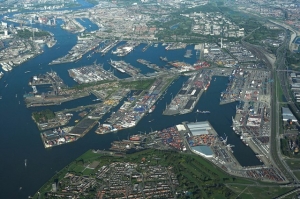


(Posted on 27/04/22)
In the first quarter of 2022, 1.5% less freight passed through the Port of Rotterdam than in the same period last year: 113.6 million tonnes compared to 115.2 million tonnes in the first quarter of 2021. Especially the throughput of mineral oil products and iron ore fell. The throughput of LNG and other liquid and dry bulk (raw materials in particular) increased. The container volume was slightly below the 2021 level.
In the dry bulk segment, iron ore & scrap fell (-19.5% to 5.6 million tonnes). High energy costs and diminishing demand for steel caused German steel production to slump. Reduced demand was especially due to disruptions in logistics chains, causing production levels of steel processing companies to drop. Coal throughput slightly rose (+3.5% to 3.9 million tonnes), as demand for energy coal (for power plants) increased more sharply than demand for cokes (for blast furnaces). For electricity production coal is cheaper than gas at this moment. For other dry bulk there is a massive increase in comparison with last year (33.5% to 3.9 million tonnes). Despite the high prices, demand for raw materials has soared.
The total throughput in the breakbulk segment (Roll-on/Roll-off and other breakbulk) increased by 19% to 8.4 million tonnes. In the segment of other breakbulk, an increase (+13.7% to 1.7 million tonnes) resulted from a higher non-ferrous throughput and a shift from container cargo to breakbulk, brought on by the rates in container shipping. Much Russian cargo currently remains at the breakbulk terminals.
Allard Castelein, CEO Port of Rotterdam Authority: ‘Although we started the year exceptionally well, the world was hit by the war in Ukraine in late February. Besides the fact that this conflict is a terrible humanitarian disaster, it led to serious uncertainty in world trade and changes in logistical parameters. Although no one can predict how this will unfold, we expect that the developments in Ukraine and the seriously deteriorated relationship between Russia and many other countries will impact throughput volumes for the rest of the year as well.’
In March, the impact of the war in Ukraine was reflected in falling volumes to Russia. Most shipping companies introduced a booking stop for Russian container cargo, and most deep-sea terminals do not accept any export cargo from Russia any longer. This will affect transhipment volumes to Russia even further. In the first quarter, the consequences of the COVID lockdowns in Shanghai were not yet noticeable in Rotterdam.
In the port of Rotterdam last year, 62 million tonnes of almost 470 million tonnes of throughput was Russia-oriented (13%). Many energy carriers from Russia are imported via the port of Rotterdam. In 2021, roughly 30% of crude oil, 25% of LNG, and 20% of oil products and coal came from Russia. Russia exports steel, copper, aluminium and nickel through Rotterdam. In 2021, 8% of container handling was Russia-oriented. As the war in Ukraine only began in late February, the impact on throughput volumes in the first quarter was still limited. Meanwhile, the impact of the sanctions and of the decisions of individual companies not to do any business with Russia any longer, has become noticeable in almost all sectors.
In total, liquid bulk throughput decreased by 1.0% to 51.5 million tonnes. Primarily the falling transhipment volumes (-21.5% to 6.0 million tonnes) led to lower throughput in the container segment (-5.4% to 35.6 million tonnes).
With this year’s Rail Conference “Rail Freight Transport and Seaports”, a joint initiative... Read more
Asian Bulk Logistics (ABL Group) and ICG have jointly announced the successful completion of ABL&rsquo... Read more
Abu Dhabi based AD Ports Group, a leading global enabler of integrated trade, industry and logistics... Read more
The Executive Board of Hamburger Hafen und Logistik AG (HHLA) has appointed Patrick Krawutschke as Managing... Read more
Abu Dhabi based AD Ports Group, a global enabler of integrated trade, transport, industry, and logistics... Read more
This year marks a significant milestone in maritime innovation as Port Hedland, Australia, celebrates... Read more
Associated British Ports (ABP), the UK’s leading port operator, has announced the latest tranche... Read more
During the Investment, Labour, and Trade Promotion Programme in Japan (November 16–22, 2025),... Read more
AD Ports Group subsidiary Khalifa Economic Zones Abu Dhabi - KEZAD Group, the largest operator of integrated... Read more
Abu Dhabi based AD Ports Group, a global enabler of integrated trade, transport, industry, and logistics... Read more